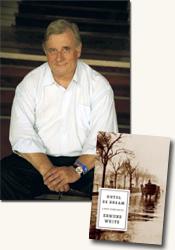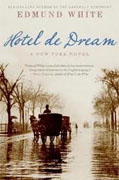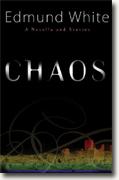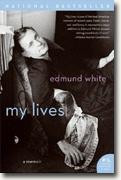author interview
book reviews:
· general fiction
· chick lit/romance
· sci-fi/fantasy
· graphic novels
· nonfiction
· audio books
· author interviews
· children's books @
curledupkids.com
· DVD reviews @
curledupdvd.com
newsletter
win books
buy online
links
home
for authors
& publishiss
for reviewers
The maga Portunista and her colorful subcommanders lead a ragged, outnumbered brigade in the wake of an international war, against her increasingly ruthless adversaries. But the ambitious commander finds herself irreconcilably drawn to a charismatic, kind and hopeful stranger. Click his e for more on Cry of Justice or read our review.
|
|||||
 
Michael Leonard interviewed author Edmund White about
his novel
Hotel de Dream Interviewer Michael Leonard: How did Hotel de Dream Edmund White: I read in John Berryman’s biography of Crane years ago the anecdote that Crane had started a book about a boy prostitute and abandoned it under pressure from his friend Hamlin Garland. I’ve since come to be skeptical about almost every aspect of the anecdote (which has but one – unreliable - source), but at the time it seemed to me so extraordinary that Crane, a proto-Hemingway author best known for his evocation of war, might have written sympathetically about homosexuality in the 1890s. I never forgot that possibility which, had it been realized, would have opened up another dimension to American fiction. At the core of the novel is this story that Crane may have written called “Flowers of Asphalt,” about a boy prostitute, but unfortunately no trace of it remains. Would you like to tell us a bit about the possible existence of this story and how you ultimately turned it into The Painted Boy? James Huneker, Crane’s friend, relates that he and Crane one night were accosted by a boy who initially they thought was begging but who later they realized was wearing mascara and was soliciting. According to Huneker, Crane was initially sickened by the idea of homosexuality but that soon enough he grew interested in the boy’s story. He fed him and quizzed him and eventually borrowed money to pay for medical treatment for the boy. This anecdote I expanded into an entire novella. Not one paragraph of Crane’s text remains, if it ever existed (Huneker claims that Crane wrote forty pages of it). What research did you do and what kinds of sources did you mine to bring Crane's world, and also the world of late 19th-century Manhattan to life for us? What were some of the challenges in recreating this world? Anything to do with gay life in the 19th century is pretty obscure and has only recently been emerging. I was influenced by Jonathan Ned Katz’s Love Stories: Sex Between Men Before Homosexuality and by George Chauncey’s Gay New York: Gender, Urban Culture, and the Makings of the Gay Male World.
Huneker again claimed that his name was Coolan and that he had large violet eyes. The novel is filled with color and life, and obviously the portrayal of New York's gay world is central to the novel. Can you tell us what it might have been like for gay men then, and particularly for boys like Elliott to survive in such a world? Half the population of Manhattan lived in tenements, which meant eight to a room without running water, hygiene, heating or fresh air—perfect breeding grounds for tuberculosis. Gays themselves seemed highly uncertain about how to view themselves. Were they women in disguise? The “Third Sex”? Androgynes? Inverts? Freud’s ideas had yet to emerge (not that they were much of an improvement).
You describe how James "flutters away like an English Matron" and Wilde being a "mildewed chump." Even Crane's own boy whore book is labeled an "abomination." Taking this into consideration, how did the specter of Oscar Wilde's trial and conviction affect the attitudes of the characters in the novel and also the social attitudes of the time? I think that most educated people did consider Wilde to be an abomination. Certainly the details of his encounters with boy prostitutes in London and his “corruption” of Lord Alfred Douglas did seem shocking to the public (and would probably not go down very well now in our period, obsessed with the specter of pedophilia). There were some English intellectuals, however, mostly women, who pitied Wilde and realized how hypocritical Wilde’s former friends were being to disown him so thoroughly.
Crane's own fascination with the downtrodden seems to give him the necessary inspiration to ahead with his story. When he first meets Elliott, he's fascinated, but how do you think Crane would have reacted to a boy like Elliott and all of the other "kohl eyed fairy boys" and "brownie queens?" I think the fact that Crane was brought up in a sheltered world by a Methodist minister and a mother who was a temperance worker ensured that he had no preconceived ideas about homosexuality. When he encountered it for the first time as an adult he was no doubt shocked, but he was a reporter who loved low life (that was his beat). The fact that he was physically tiny and ill might have made him more vulnerable to other examples of suffering humanity (Crane died of TB at age 28). Cora wants Stephen to finish The O'Ruddy so they can pay off their debts, but she goes along with his plan to write The Painted Boy anyway. Why do you think she approaches his wishes with such a pragmatic and no-nonsense attitude? I think she loved him and knew that he loved her. Initially her love for him was inspired by her esteem for him as a writer (she too had literary ambitions). She was a prostitute and kept a brothel in Jacksonville, Florida called Hotel de Dream where she first encountered Crane as a customer—and as a literary luminary.
I think that Crane had a true bohemian horror of respectability, which predisposed him to Cora. He had already come into conflict with the New York police department for defending other prostitutes—and the animosity of the cops made it impossible for Crane to work in New York after that as a journalist. I think he responded to Cora’s basic generosity of soul.
You describe Stephen and Elliott as "fearless in battle" and "weary of life." One is riddled with tuberculosis, the other with syphilis. Keeping this in mind, are Elliott and Stephen in fact, a mirror image of each other, perhaps even two sides of the same coin? I see Elliott as Crane’s “genius,” something like the life force, the spiritual side, and the boy within him—certainly his muse. How do you think Elliott's syphilis has affected his circumstances in New York? What were you trying to show here? Is his condition perhaps a metaphor for the AIDS crisis? Theodore Koch, the older man in love with Elliott, believes that he, too, has been infected with syphilis and that the two of them will eventually suffer from the tertiary forms of syphilis, tabbies (withering away of the inner organs) or dementia. Yes, both syphilis and tuberculosis were something like precursors to Aids in the late twentieth century. Love and loyalty - or lack thereof - are themes that weave throughout. There's Cora's palpable love for Stephen, and also Theodore's obsessive love and sexual attraction for Elliott. What part do you think love plays in the characters' interactions with each other? There is “esteem love” (so dear to Corneiille) between Theodore and Christine and Theodore and his children and “passion love” between Theodore and Elliott. Cora and Crane have a higher form of love, which combines both passion and esteem. Death and decay also seem to echo throughout, especially in regard to Crane's debilitating illness and also Elliott's gradual decline from syphilis. But there's also the need to defend Elliott's youth and beauty. In this respect, what do you think is the significance of Theodore's insistence in having Elliott's features preserved in the marble boy? I suppose a work of art—even a bad one like Piccirilli’s statue of Elliott—is always a struggle against oblivion, even as my novel could be counted as just such a rocket to escape the gravitational pull of time. Of course I was very influenced as a boy by Hawthorne’s The Marble Faun and other Hawthorne tales such as “Rappacini’s Daughter.” The actual way of fabricating the statue was inspired by a visit I made years ago to Canova’s studio in Italy.
Even though I co-authored the original Joy of Gay Sex, I always thought I’d be better suited to write The Tragedy of Sex and Love. I have a view of passionate love worthy of Racine, one of my literary forebears. Hotel de Dream You would think so, but I wrote it straight through in an e draft in a period of nine months of research and writing. To those readers who like the book I might whisper that I felt inspired writing it. Which character do you think undergoes the most profound change in the novel? I suppose Theodore, who starts out a banker nearly comatose with respectability and ends as a martyr skinned alive by passion. How do you think Stephen Crane (and also Elliott and Theodore for that matter) would react to modern 21st century gay life if they were alive today? I’m afraid modern gay life is so debased that it doesn’t offer much to anyone, not even to us who invented it. You've been writing now since the early 1970s, and have amassed such a huge body of work. Which novel most resounds with you? And do you have any advice for would-be writers who are just starting out? Like a parent I like all my children, though the novels slightly more than the non-fiction, which seems more ephemeral (with the exception of my autobiography, My Lives). Which authors have most influenced your work over the years? Christopher Isherwood and Vladimir Nabokov. And finally, are you working on a new project at the moment? If so, would you like to tell us a little bit about it? I’m writing a short biography of the 19th-century French poet Arthur Rimbaud, half of a famous male-male couple—his other half was Paul Verlaine, an older poet. Edmund White's novels include Fanny: A Fiction, A Boy's Own Story, The Farewell Symphony, and A Married Man. He is also the author of a biography of Jean Genet, a study of Marcel Proust, The FlÂneur: A Stroll Through the Paradoxes of Paris, and, most recently, his memoir, My Lives. Having lived in Paris for many years, he is now a New Yorker and teaches at Princeton University. Michael Leonard is a contributing reviewer to curledup.com. His interview with Edmund White was written in conjunction with his review of Hotel de Dream. © Michael Leonard/2007.
|
|||||
| fiction · sf/f · comic books · nonfiction · audio newsletter · free book contest · buy books online review index · links · · authors & publishiss reviewers |
|
| site by ELBO Computing Resources, Inc. | |



